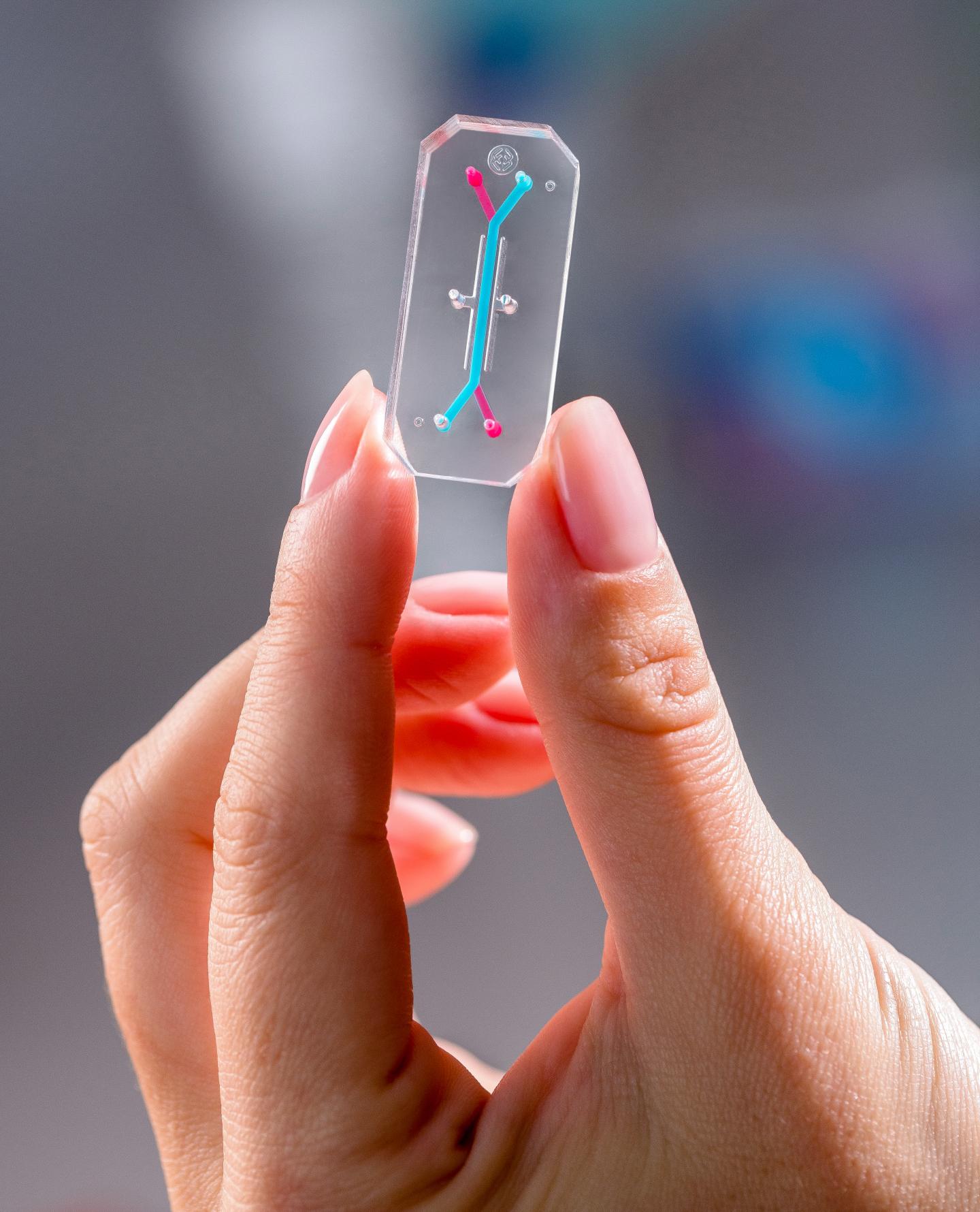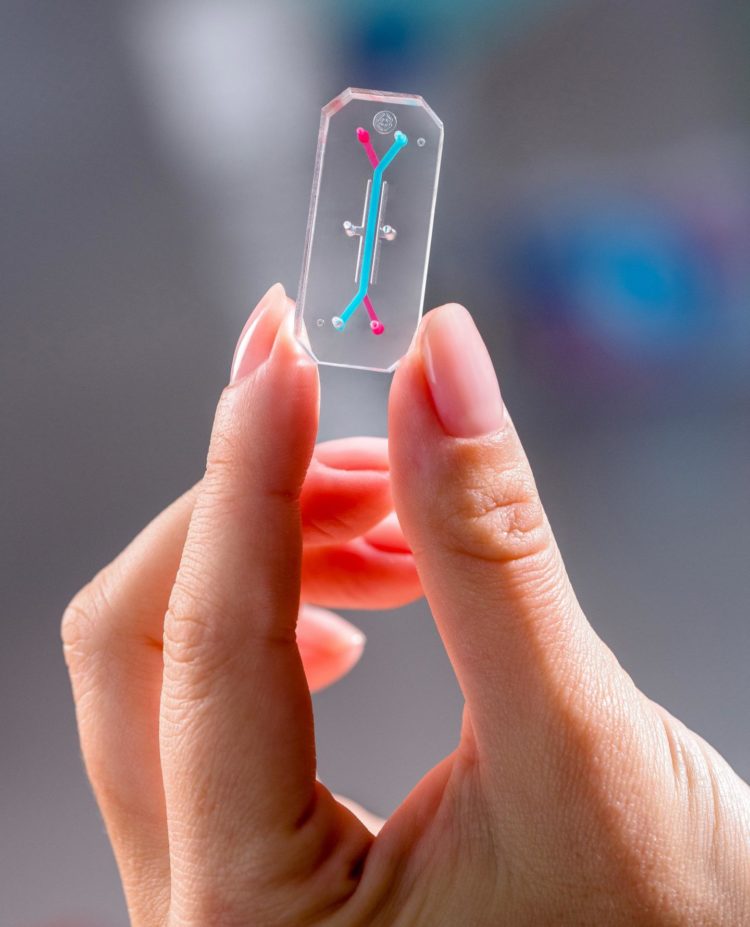Liver-chip, Kidney-Chip, and new Intestine-Chip are integrated with lab-ready instrumentation that does not require specialized organs-on-chips expertise by researchersC

Credit: Emulate, Inc.
BOSTON, Mass., March 19, 2020 –Organs-on-Chips technology has entered the mainstream and has reached 150 installations for use by researchers across many industries, including 10 of the top 25 biopharmaceutical companies, as well as leading international academic research centers and U.S. government laboratories, including the U.S. FDA through a collaborative agreement and the U.S. Army.
Organ-Chips that are currently available for use in the lab-ready platform developed by Emulate, Inc., include the Liver-Chip, Kidney-Chip, and new Intestine-Chip, launched commercially earlier this year. Ongoing R&D is supporting the development of additional Organ-Chips, such as the Brain-Chip, and new applications in key areas of biology and diseases, including applications in neurodegenerative disease, gastrointestinal diseases, and infectious diseases, such as COVID-19.
Combining biology and microengineering, Organ-Chips contain tiny hollow channels lined with tens of thousands of living human cells and tissues and can be used to predict human response. For early adopters conducting R&D related to drug discovery and development, the Organ-Chip platform provides human-relevant insights and answers to the complex questions required for disease modeling, target validation, and safety assessment in drug development.
Researchers can culture the chips–including the Liver-Chip, Kidney-Chip, and Intestine-Chip–using Emulate’s portfolio of protocols, enabling research to understand how the human body responds to disease, medicines, chemicals, and foods. The lab-ready platform – including the Zoë® Culture Module, Organ-Chips, and application tools – recreates key factors of the body’s dynamic cellular microenvironment, including tissue-to-tissue interfaces, fluid flow, and mechanical forces.
The lab-ready platform enables researchers with no prior experience with Organs-on-Chips to conduct studies, using the platform’s supporting protocols and software to collect, analyze, and share data. This platform integrates into the workflows of researchers developing new drugs and products, providing human-relevant mechanistic data on toxicity and diseases that researchers can use to assess safety risks and make informed, efficient decisions throughout the drug discovery and development process.
“We are excited to see researchers in industry, government, and academia use our Organs-on-Chips platform for a range of applications, including human-relevant disease modeling and studies to gain insights related to new drug modalities and disease mechanisms that are not feasible with conventional animal models or cell cultures,” said Geraldine A. Hamilton, President and Chief Scientific Officer of Emulate, Inc. “Organs-on-Chips technology provides a window into the inner workings of human biology and disease, and by putting the technology in the hands of researchers, we are changing the way medications and products are evaluated to help improve human health and bring new cures to patients.”
Emulate’s platform is comprised of the following key components:
- Organ-Chips that have a proprietary design to support dynamic cellular interactions, including tissue-to-tissue interfaces, fluid flow, and mechanical forces that emulate the appropriate microenvironment cells need for accurate biological translation.
- Zoë® Culture Module is a lab-ready instrument that automates the dynamic flow of cell culture media and the mechanical forces required for any user to work with Organ-Chips in a robust and reproducible manner. Zoë instrumentation can run up to 12 Organ-Chips simultaneously and is powered by the Orb™ Hub Module, which provides the precise required mixture of gas, power, and vacuum stretch.
- User application tools, including content and software:
- Experimental applications content that provides users with protocols, study plans, and representative data sets for specific applications of the platform such as Liver Mechanistic Toxicity, Kidney Drug Transport, and Intestine Absorption and Metabolism.
- Software applications that enable study design and management, data analysis, integration with standard analytical tools, and collaboration among teams using Emulate’s platform.
Emulate’s lab-ready platform has its origins in a $37 million grant from the Defense Advanced Research Projects Agency (DARPA) in 2012 to the Wyss Institute for Biologically Inspired Engineering at Harvard University to create Organs-on-Chips to study complex human physiology outside the body. This foundational research enabled the development of chips with a level of human-relevant biological complexity not feasible with conventional cell-based systems, as well as instrumentation designed to enable any researcher to use the technology in their laboratories. Based on the success of this early research, Harvard established a worldwide license agreement to form the start-up company, Emulate, and the company became operational in January 2015. The Emulate team accelerated development of Organs-on-Chips technology to create the platform that is now commercially available, working with an extensive community of collaborators across industry, academia, and government agencies.
In addition to applications in drug discovery and development, Emulate’s platform can be used in other industries, including cosmetics, food, chemical-based consumer products, and personalized health, to enable new understanding of human response to products.
Information about Emulate’s products are available on the Products section of the company’s website.
###
About Emulate, Inc.
Emulate Inc. is a privately held company that creates living products for understanding how diseases, medicines, chemicals, and foods affect human health. Our lab-ready platform, including Zoë® instrumentation, Organ-Chips, and application tools, provides a window into the inner workings of human biology and disease — offering researchers a new technology designed to predict human response with greater precision and detail than conventional cell culture or animal-based experimental testing. Each of Emulate’s proprietary Organ-Chips — including the liver, intestine and kidney — contains tiny hollow channels lined with tens of thousands of living human cells and tissues and are approximately the size of an AA battery. An Organ-Chip is a living, microengineered environment that recreates the natural physiology and mechanical forces that cells experience within the human body. Our founding team pioneered the Organs on Chips technology at the Wyss Institute for Biologically Inspired Engineering at Harvard University. Emulate holds the worldwide exclusive license from Harvard University to a robust and broad intellectual property portfolio for the Organs-on-Chips technology and related systems. For more information, please visit http://www.
Media Contact
Kathryn Morris
[email protected]
914-204-6412





